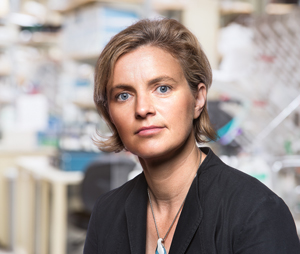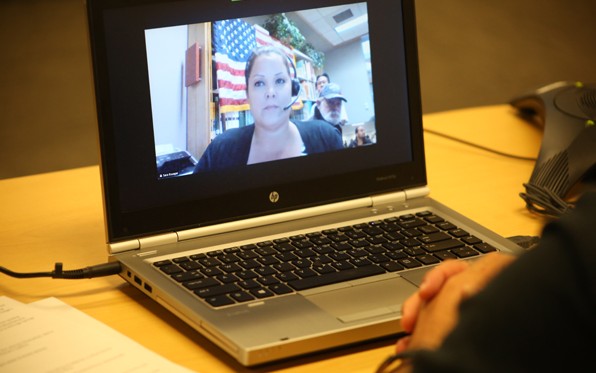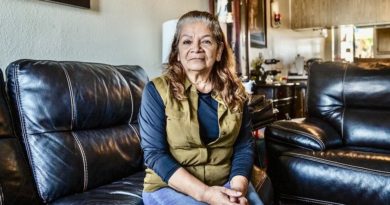Daily Business Report-Oct. 7, 2015
Gov. Jerry Brown will sign SB 350 today in Los Angeles.
Gov. Brown to Sign Landmark
Renewable Energy Legislation
City News Service
Gov. Jerry Brown will visit Griffith Observatory in Los Angeles Wednesday to sign legislation mandating that half of the state’s electricity come from renewable sources by 2030.
The ambitious mandates of SB 350, championed by Senate President pro tem Kevin de Leon of Los Angeles, were outlined by Brown in his inaugural address in January. But de Leon’s legislation was significantly watered down last month in the state Assembly, which stripped away a requirement that the state slash its gasoline use by 50 percent in the next 15 years. That provision sparked heated debate in Sacramento, thanks to opposition from the oil industry and concerns from some Democrats who feared possible economic fallout from the move.
Despite the loss of the gasoline provision, de Leon said the legislation still includes steps that “build on California’s historic commitment to lead the world in the fight against climate change and build a healthy and livable planet for our children and grandchildren.
“But our efforts to reduce carbon emissions are far from over as global warming and air pollution remain one of the most important issues of our generation and one of the greatest threats for generations to come,” he said.
Even with the elimination of the gasoline provision, the legislation was still met with opposition by Republicans.
“This bill will increase the cost of living for residents who are already struggling to make ends meet,” Assemblyman Matthew Harper, a Republican representing Huntington Beach, told the Los Angeles Times in September.
__________________________________________________

Air Force Announces $3.2 Billion
In Global Hawk Funding
AUVSI News
The U.S. Air Force announced that it will continue to fund the development, modernization and sustainment of the Northrop Grumman RQ-4 Global Hawk through the end of fiscal year 2025, at a funding level of $3.2 billion.
Orders for the aircraft will be made by the end of fiscal 2020. Air Force officials cited the Global Hawk’s much lower operating costs as its reason for selecting the platform — a drop of 40 percent in the last three years.
The platform will eventually replace the aging U-2 fleet, which is planned for retirement from 2016 through 2019.
Potential modernizations of the platform include a new electro-optical sensor, which could take up about half of the new funding, according to a report by Reuters.

Illumina Expands Low-Cost Gene
Sequencing to Plants, Livestock
San Diego-based Illumina announced Tuesday its HiSeq X system can now be used to perform whole-genome sequencing of plants, livestock and other non-human species.
The company introduced the first $1,000 human genome, and now sees a market opportunity in the low-cost, population-scale sequencing of non-human species in agricultural and pharmaceutical research.
“Market adoption of the HiSeq X system for population-scale studies has exceeded our expectations and we are excited for new and existing customers to take their research to new heights,” said Francis deSouza, president of Illumina.
Emma Millican, director of scientific operations for the Wellcome Trust Sanger Institute, said the Illumina system can be used to better understand the genetics and biological processes of non-human organisms, a development which is considered important for public health.
“The Sanger Institute plans to extend whole-genome population sequencing to many more medically relevant organisms in the future,” she said.
Illumina is the global leader in DNA sequencing and array-based technologies.
ATT Invites Job Applicants
AT&T will hold a hiring event Thursday at its San Diego corporate office for persons seeking retail positions with the company. The company said it will fill nearly 340 retail positions across the state.
The hiring event will be from 9 a.m. to 3 p.m. at the corporate office at 5738 Pacific Blvd., San Diego.
Walk-ins will be welcome, but applicants are encouraged to apply online. For a list of available positions, and to apply, visit http://connect.att.jobs/California.
Governor Vetoes 3 More UAS Bills
Gov. Jerry Brown has vetoed three more Unmanned Aircraft System bills. The pieces of legislation would have prohibited civilians from flying unmanned aircraft systems over wildfires (SB 168), schools (SB 271) and prisons and jails (SB 170). Brown said there are already laws that deal with the problems addressed.
According to Brown, “Each of these bills creates a new crime — usually by finding a novel way to characterize and criminalize conduct that is already proscribed. This multiplication and particularization of criminal behavior creates increasing complexity without commensurate benefit.”
Brian Wynne, president and CEO of the Association for Unmanned Vehicle Systems International (AUVSI), said the governor’s message echoes AUVSI’s guidance to states on UAS legislation: “AUVSI believes there is already a robust legal framework to allow aircraft systems to operate without infringing upon constitutional rights protecting privacy, and that this framework is applicable and sufficient to guide the use of systems in which the ‘cockpit’ and pilot are on the ground.”
UC San Diego Top Institution in U.S.
For Environmental and Earth Sciences
The journal Nature ranked UC San Diego first in the United States and fourth worldwide in earth and environmental research in a new survey that rated institutions based on their total contribution to studies published in major science journals.
UC San Diego placed behind the Chinese Academy of Sciences, the French National Centre for Scientific Research, and the Helmholtz Association of German Research Centers, which took the top three spots in that order.
Rounding out the top 10 were NOAA, NASA, the California Institute of Technology, University of Washington, the Swiss Federal Institute of Technology at Zurich, and Woods Hole Oceanographic Institution.
Two major private gifts to Scripps recognize the importance of leveraging the excellence reflected in the journal’s ranking, according to UC San Diego officials. In March, Robert and Allison Price, through Price Philanthropies, donated $6 million to UC San Diego’s Birch Aquarium at Scripps Institution of Oceanography. The gift will establish the Price Philanthropies Ocean Science Education Fund, an education outreach program in ocean and earth science. In August, Richard and Carol Dean Hertzberg made $5 million gift to Scripps to establish the Center Climate Change Impacts and Adaptation, which will draw on expertise throughout the UC San Diego campus to create practical solutions to climate change effects already taking place or anticipated.
Tribune Offers Buyouts to U-T Employees
The parent company of the Los Angeles Times, San Diego-Union Tribune and other papers across the country announced an employee-buyout plan Monday as a way to cut costs at the media conglomerate that recently overhauled the management of its Southern California papers.
Tribune Publishing Co. CEO Jack Griffin announced the plan in a memo distributed to employees, saying the “Voluntary Separation Program” will allow employees to “make decisions about their own personal and professional situations at a time when the company must continue to execute on its strategic plan, which includes reducing costs.”
According to the Chicago Tribune, employees who take the deal would receive one week of base pay for every year of employment up to 10 years, two weeks of pay for 11 to 20 years of service and three weeks for years 21 and up, with the buyout capped at one year’s pay.
Employees must apply for the buyout by Oct. 23.
Salk Researcher Awarded $3 Million
Grant to Understand Cell Nucleus

As part of a $120 million, 5-year initiative to understand the cell’s nucleus, the National Institutes of Health has awarded more than $30 million to San Diego researchers, including the Salk Institute and the UC San Diego. Salk Associate Professor Clodagh O’Shea has been awarded a grant of $3 million over five years, along with the possibility of tapping into an additional opportunity pool of $3 million each year for the period.
The national effort, called the 4D Nucleome Program, is a collaborative research project consisting of six related initiatives, encompassing 29 awards to 24 institutions in the United States. By bringing together physicists, engineers, biologists, bioinformaticians, clinicians and others to develop new techniques, the program will enable researchers to develop novel technologies, resources and data to understand the genetic architecture of the nucleus, as well as how aberrations contribute to human health and disease.
Although the human genome has been decoded, how DNA — along with proteins that turn genes on and off — is packed in space and time is still a mystery. Human DNA in a single cell is about 6 feet long and folds with proteins into intricate packages (chromatin) to fit within a nucleus.
This spatial configuration is one that has confounded scientists but holds the clues to preventing, diagnosing and treating diseases, like cancer.
Polar Region Changes in Response to
Global Warming Focus of Symposium
The American Polar Society, the 80-year-old organization linking scientists, explorers, and enthusiasts with deep interest in polar issues, and Scripps Institution of Oceanography at UC San Diego, are jointly bringing together world-class leaders in science and diplomacy in a symposium to review the latest findings from research on the impact of rising global temperatures on sea and land ice and their ecosystems at the top and bottom of the world.
To be held at Scripps Oceanography Nov. 3-6, the symposium will feature the latest research of such scientific luminaries as David Ainley, Cecilia Bitz, Lawson Brigham, Julian Dowdeswell, Sylvia Earle, Jacqueline Grebmeier, James Hansen, Ola Johannessen, Gerald Kooyman, Walter Munk, Claire Parkinson, Ted Scambos, Lynne Talley, David VanderZwaag, and John Walsh.
“Climate change in the past several decades has been apparent in many locations around the world, but nowhere is it more evident than in the polar regions,” saidAlfred S. McLaren, president of the APS, who has organized the conference with Scripps to commemorate the APS’s 80th anniversary. “In the Arctic, retreating sea-ice cover, melting glaciers, thawing permafrost, and bubbling methane gases are already impinging on indigenous Arctic cultures and numerous species, from microscopic organisms living within the ice to the massive walrus and majestic polar bear.
“In the Antarctic, the effects of global warming on biological marine life are, at present, less clear, although there has been significant decay of the gigantic Antarctic ice sheet and ice shelves, assisted by warming ocean waters.”
San Diego Establishes Fine
For Disabled Parking Violators
City News Service
The City Council Tuesday approved a series of actions that will broaden enforcement actions against people who misuse disabled parking placards in San Diego.
According to a city staff report, it’s estimated that 60 percent of the handicapped placards — which allow parking in preferred spaces — are abused, and the “flagrant” and “willful” misuse is increasing substantially.
“I think everyone has seen what they believe to be, or looks like, people who are perfectly able-bodied taking spaces and hopping out of a car,” Councilwoman Lori Zapf said.
Currently, only police officers in San Diego are allowed to enforce the use of the placards. The new ordinance will allow parking enforcement officers to write tickets.
The council also established a $740 fine for an offense, and state law requires an additional 10 percent penalty.
The staff report said police officers average issuing 400 citations for placard abuse each year.
In other action, the council approved a three-year deal with Car2Go to establish an electric vehicle rental program in San Diego. The city and Car2Go had been working on a pilot program since 2011, in which vehicles are rented by the minute and driven in a defined area.
According to city staff, more than 7,000 trips are made per week in Car2Go’s 400-vehicle local fleet.
The agreement includes an option to renew for two additional years.

Vet Connect Makes Benefits
Easier for Veterans to Access
Veterans in rural San Diego County can look forward to an expanding network of access points for services and benefits as a result of the expansion of the Vet Connect program of county government.
Vet Connect is a service that allows veterans in rural areas to go to their local library and visit face-to-face with a veterans services representative or use video conferencing to access services and complete paperwork without having to travel to the Military and Veterans Affairs Office in person.
“Vet Connect bridges the gap between the veteran and veterans resources,” said Supervisor Bill Horn. “It brings that service home to the veteran’s neighborhood with no long distance travel required.”
“It makes it so much easier for a veteran to go to a county library, which are all over the region, and be able to connect directly Downtown with Veterans Services,” said Supervisor Dianne Jacob. “They can fill out forms and get all kinds of information, and they can stay right in their community, right at the library.”
Vet Connect allows veterans expanded access to the San Diego County Health and Human Services Agency’s Veterans Services to complete applications for benefits, get referrals for services or have their questions answered.
Currently, County Veterans Services sends representatives to do face-to-face benefits counseling at the Ramona, Rancho San Diego, El Cajon and Pine Valley libraries on select days each month.
UC San Diego Researchers
Team Up with Illumina
The human microbiome — the total collection of bacteria, viruses and other microorganisms living in and on your body — has been linked to a variety of health and disease states, including obesity, allergies, asthma, and a rapidly growing list of other conditions. But as researchers try to sort out the complex relationship between microbial populations and human health and use that information to diagnose or treat disease, they are generating a deluge of microbial sequence data that first needs to be organized and analyzed.
To this end, UC San Diego School of Medicine’s Rob Knight and his team built a microbiome analysis platform called QIIME (short for Quantitative Insights Into Microbial Ecology). This software will now be more readily accessible to hundreds of thousands of researchers around the world through BaseSpace, a cloud-based app store offered by Illumina, a San Diego-based company that develops life science tools for the analysis of genetic variation.
Two high-profile microbiome studies that rely on QIIME are the Human Microbiome Project, a National Institutes of Health-led initiative akin to the Human Genome Project, and the American Gut Project, a crowdsourced, crowdfunded project in which Knight’s team is sequencing as many human microbiome samples as possible, from anyone who wants to participate.
Researchers are already eager to use QIIME in their own studies, including many at UC San Diego.
Registration Now Open for USD
Online Master’s Degree in Cyber Security
Professionals looking to enter or expand a career in cyber security can now register for the University of San Diego’s new online Master of Science in Cyber Security Operations and Leadership.
The degree program will meet the needs of professionals currently working in cyber security roles or those who wish to enter this growing field. Candidates must have a bachelor’s degree and a GPA of 2.75 or higher. The completion of a standardized test, such as a GRE may be submitted to strengthen an application.
Offered completely online to better meet the needs of working professionals, the 31-unit program can be completed in five semesters. Classes for the spring semester will begin Jan. 19, 2016.
For more information and registration go to http://CyberOps.SanDiego.edu, email CyberOps@sandiego.edu or call (619) 260-4580.
Coastal Commission OKs 20-Year
Storage of Nuclear Waste at San Onofre
City News Service
The California Coastal Commission voted unanimously Tuesday to grant Southern California Edison a 20-year permit for an expanded nuclear waste storage facility at the San Onofre Nuclear Generating Station in northern San Diego County.
Officials at Rosemead-based Edison, which operates and is the majority owner of the idled nuclear plant, said the current 14-year-old storage area is nearing capacity.
SCE estimated that it will need up to 80 more steel-and-concrete-encased canisters, a technology known as dry storage. About two-thirds of San Onofre’s used fuel is currently stored on site in steel-lined, concrete storage pools known as wet storage.
Environmental groups argued that it makes no sense to store the spent fuel right next to the shoreline in an earthquake-prone area.
Edison, however, contended that a below-ground concrete monolith that will house the dry storage canisters exceeds state earthquake requirements, and will also be designed to protect against fire and tsunamis.
Commission staff recommended that the permit be approved, in part because the federal Nuclear Regulatory Commission said it meets safety standards.
Staff also said the federal government hasn’t been able to provide a location for spent nuclear fuel to be stored. A proposed site in Nevada has been held up for years because of still political opposition.
“That’s the crux of the problem — the federal government has failed to designate a permanent repository for the spent nuclear fuel,” said Coastal Commissioner and San Diego County Supervisor Greg Cox.
“It’s something they’ve been working on for 20 or more years, and it’s something that’s not unique to (San Onofre) — it’s something a number of other closed nuclear power plants across the country are having to deal with,” he said.



